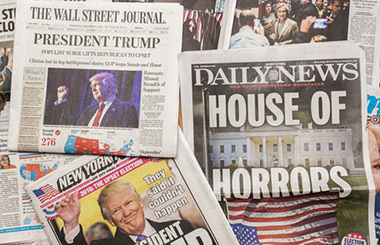Young Americans'abysmal global literacy rating a troubling trend
A recently released survey about what college-aged students in the United States know about the world is both shocking and telling, especially when it comes to China.
The global literacy survey, sponsored by the Council on Foreign Relations and the National Geographic Society, found that only a quarter (25 percent) of the students knew that China was a country with veto power over United Nations Security Council resolutions due to its status as a permanent member of the council. About 35 percent said they didn't know and 20 percent picked Germany.
Only 29 percent correctly picked Indonesia a country with the majority of its population being Muslim from a list that included South Africa, Armenia and India. An equal 29 percent believe India is a Muslim majority nation.
Meanwhile, less than half (49 percent) knew that Mandarin Chinese was spoken by the most people in the world as their primary language.
The survey of 1,203 adults age 18-26 who currently attend or have recently attended a two- or four-year college in the US also found that 67 percent believe China has a larger economy than the US. Only 29 percent think the US economy is larger.
Such a lack of understanding of China and world affairs may well explain why US politicians, such as the two 2016 presidential candidates, Republican Donald Trump and Democrat Hillary Clinton, can still publicly and falsely accuse China of currency manipulation despite the basic facts.
Fred Bergsten, a senior fellow at the Peterson Institute for International Economics, who years ago accused China of currency manipulation, is now saying that there is no currency manipulation in China and if there is, it's only positive manipulation.
The US Treasury Department issued a report on Oct 14 on the foreign exchange policies of its major trading partners. While the report said China has a significant bilateral trade surplus with the US, the country’s current account surplus fell to 2.4 percent of the GDP for the last four quarters through June 2016, moving below the established threshold for the criterion.
"China's intervention in foreign exchange markets has sought to prevent a rapid RMB depreciation that would have had negative consequences for the Chinese and global economies," it said.
What is heartening out of the survey is that more people (79 percent) answered the question correctly that the US imports more from China than any other country. It is unknown if it is due to the fact that Made-in-China labels are everywhere in US department stores.
In the foreword of the report, Council on Foreign Relations President Richard Haass and National Geographic Society President and CEO Gary Knell collectively sighed at the significant gaps between what young people understand about today's world and what they need to know to successfully navigate and compete in it.
Only 29 percent of the respondents earned a minimal pass (66 percent correct or better). Just over 1 percent - 17 of 1,203 - earned an A (91 percent or higher).
The young people know little about some facts that have been in the news a lot in recent years. Only 28 percent knew the US is bound by treaty to protect Japan if it is attacked and only 34 percent knew this about South Korea.
More alarmingly, only 30 percent knew that the US Congress is the constitutional authority to declare war.
Such low global literacy among the educated young people is shocking because most respondents are supposed to be Americans, citizens of the world's only superpower, which likes to police the world.
It might be interesting to see what the result is if the same test is conducted among 535 voting members of the US Congress.
One reason for such low global literacy could be the fact that TV networks in the US include very little international news despite the fact that many global hot-spot issues are directly linked to US foreign policy.
The National Committee on US-China Relations, which is marking its 50th anniversary this year, will hold its annual China Town Hall event on Tuesday evening, featuring keynote speaker Henry Kissinger. The event will also include local programs in some 80 venues across the US to educate people about key issues in US-China relations.
There is no doubt that events like this can improve people's global literacy.
Contact the writer at chenweihua@chinadailyusa.com.

























